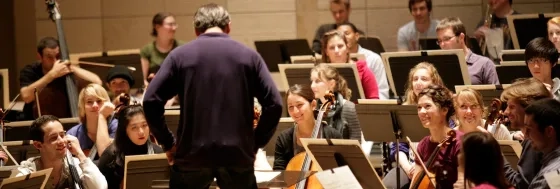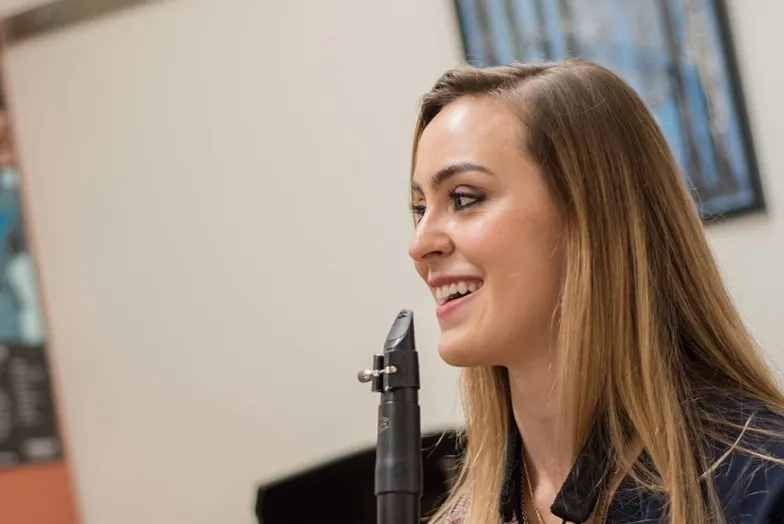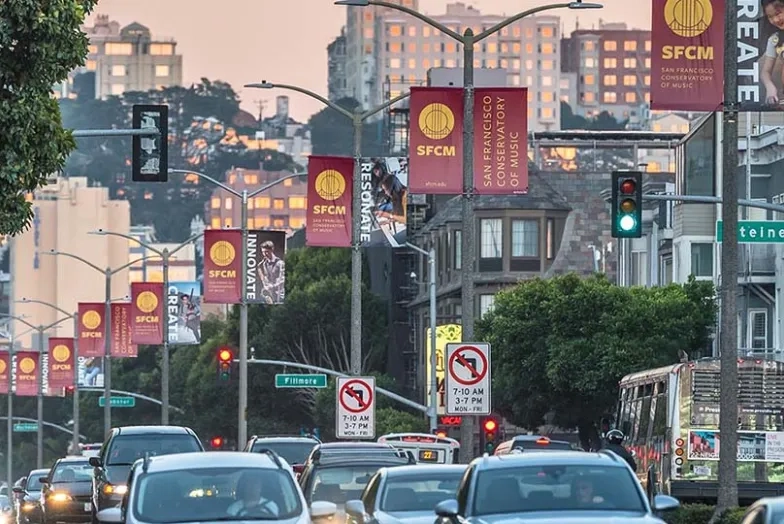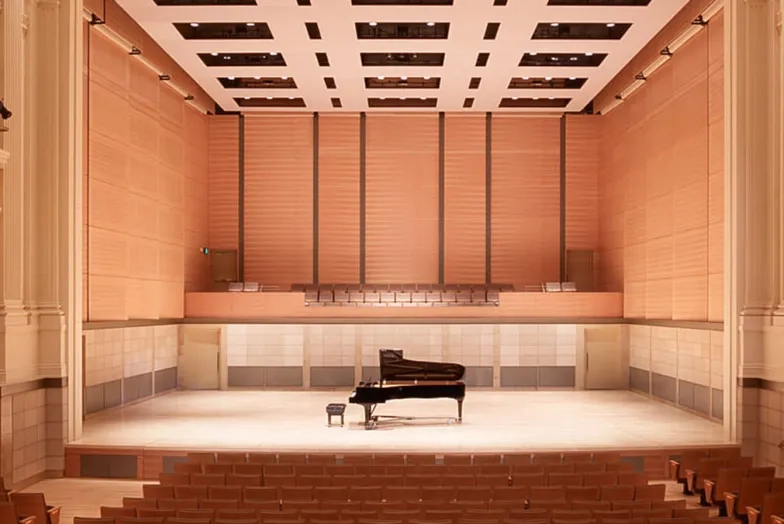Strings Bachelor of Music Curriculum
Collegiate Apply / Request Information
Life isn’t an audition.
Any music school can make you a better player. Our interconnected courses are built to transform you intellectually, artistically, professionally, and individually. You’ll understand the roots of your music, freeing you to take it somewhere new. You’ll see how your training broadens your options, rather than narrowing them. You'll find your voice. And you'll enter the world with the same confidence you bring to the stage.
Required Courses
Curriculum: Bachelor of Music in Orchestral Instruments (Harp)
Credit total: 129
| Requirement | Cr. |
|---|---|
| Private Instruction | 32 |
| Keyboard Skills | 2 |
| Performance Classes | 4 |
| Humanitied & Sciences | 30 |
| Musicianship & Music Theory | 20 |
| Music History & Literature | 12 |
| Professional Development | 4 |
| Ensemble | 22 |
| Electives | 5 |
| Winter Term | 3 Years |
| Digital Portfolio | 4 Years |
| Juries & Recitals | N/A |
Curriculum: Bachelor of Music in Orchestral Instruments (Strings)
Credit total: 129
| Requirement | Cr. |
| Private Instruction | 32 |
| Performance Classes | 4 |
| Keyboard Skills | 2 |
| Musicianship and Music Theory | 20 |
| Music History and Literature | 12 |
| Professional Development | 2 |
| Applied Practical Training | 2 |
| Ensemble | 22 |
| Electives | 1 |
| Winter Term | 3 Years |
| Digital Portfolio | 4 Years |
| Juries & Recitals | N/A |
Historical Performance Emphasis in Baroque Cello (Undergraduate) (total credits: 11-13)
- ENS 210 Conservatory Baroque Ensemble (2 semesters, 4 credits)
- ENS 212 Continuo Playing (1 semester, 2 credits). Not required if students can demonstrate prior experience.
- MHL 400 Introduction to Performance Practice (1 semester, 3 credits)
- PRF 334 Baroque Cello (2 semesters, 4 credits)
- Jury requirements as determined by Historical Performance faculty
These credits also count towards the Bachelor of Music degree.
Repertoire Requirements for String Majors
General Jury Requirements
Students are encouraged by their teachers to prepare a complete required program. What and how much will be performed at the jury will be at the discretion of the teacher. Every category of the required program, however, should be represented, time permitting. The length of the jury performance will be either 20 or 30 minutes, as determined by the teacher.
Technical Juries for Undergraduates
The string department will hold technical juries for freshman and sophomores. These juries will include major and minor scales (adding arpeggios for sophomores) chosen at random, and two études of your choice that demonstrate left hand and bow technique. Please consult with your major teacher for details.
Violin
During a four-year course of study, a student will be required to learn the following:
- A minimum of four standard concerti, such as Barber, Bartók, Beethoven, Berg, Brahms, Bruch, Dvořák, Glazunov, Lalo, Mendelssohn, Mozart, Paganini, Prokofiev, Saint-Saëns, Sibelius, Stravinsky, Tchaikovsky, Vieuxtemps, or Wieniawski. During the four years, no composer shall be represented by more than one concerto.
- Two of the six partitas or sonatas for solo violin by Bach.
- Four classical, romantic, or contemporary sonatas for violin and piano, one to be performed at the end of each school year.
- Four short virtuoso pieces—or works in a similar style—by any of the following composers: Kreisler, Paganini, Saint-Saëns or Wieniawski.
- Students will be required to perform three works from contrasting periods for their jury examination.
- Concerti must be memorized. Memory in other categories shall be at the discretion of the professor.
- Variations in the required repertoire may be made only with the consent of the string department.
- Violin majors must perform a senior recital to determine fulfillment of performance requirements.
Viola
During a four-year course of study, a student will be required to perform the following:
- A minimum of four concerti chosen from the following: Bartók, Berio, Berlioz, Bloch, Feldman, Handel, Handoshkin, Hindemith, Hoffmeister, Mozart, Nixon, Piston, Pleyel, Stamitz, Schnittke, Telemann, Walton, or Vaughan Williams. With the approval of the professor, other concerti may be selected. At least one concerto shall be performed at the end of each school year.
- At least three of the six cello suites, or the violin sonatas and partitas, or the gamba sonatas of Bach, transcribed, and at least one from the unaccompanied repertoire of Stravinsky, Reger, or Hindemith. One is to be performed at the end of each school year.
- At least four sonatas from the representative periods, one to be performed at the end of each school year.
- A fourth category may be included on the recommendation of the professor and may include études; the standard chamber music for viola, such as the duos of Mozart or Beethoven or the trio of Debussy; and the standard orchestral studies, such as Strauss Don Quixote or Don Juan.
- Concerti must be memorized. Memory in other categories shall be at the discretion of the professor.
- Variations in the required repertoire may be made only with the consent of the string department.
- Viola majors must perform a senior recital to determine fulfillment of performance requirements.
Cello
During a four-year course of study, a student will be required to perform the following:
- A minimum of four standard concerti, such as C.P.E. Bach, Barber, Beethoven Triple Concerto, Bloch Schelomo, Boccherini, Brahms Double Concerto, Dvořák, Elgar, Haydn C and D concerti, Hindemith, Lalo, Milhaud, Prokofiev, Saint-Saëns, Schumann, Schoenberg, Shostakovich, or Walton. One concerto shall be performed at the end of each school year.
- At least three of the six cello suites or the gamba sonatas by Bach, and at least one from the unaccompanied repertoire of Bloch, Britten, Hindemith, Kodály, or Reger. One is to be performed at the end of each school year.
- At least four sonatas from the representative periods, one to be performed at the end of each school year.
- A modern solo work written after 1950. With the advice of the professor, the modern work may be changed to études, virtuoso pieces, the standard chamber music for cello, such as duos of Ravel and Kodály, trios of Schoenberg and Webern, or the standard orchestral studies, such as Strauss Don Quixote.
- Concerti and Bach Suites must be memorized. Memory in other categories shall be at the discretion of the professor.
- Variations in the required repertoire may be made only with the consent of the string department.
- Cello majors must perform a senior recital to determine fulfillment of performance requirements.
Double Bass
On each jury examination, students are required to play one composition from each category unless otherwise noted.
Freshman Jury
- Baroque works: sonatas of Bach, Birkenstock, Eccles, Handel, Marcello, Telemann, Vivaldi; Bach solo cello suites (two movements)
- Concerti (one movement): Bottesini, Dittersdorf, Dragonetti, Handel, Koussevitzky, Sperger, Vanhall
- Pieces: One short work by Bottesini, Dittersdorf, Dragonetti, Koussevitzky, Sperger, Vanhall
Orchestral excerpts from the standard repertoire may be substituted for category 3 at the discretion of the professor.
Sophomore Jury
- Baroque or classical work: sonatas or other works by composers such as Bach, Beethoven, Birkenstock, Couperin, Dittersdorf, Frescobaldi, Handel, Mozart, Sperger, or three movements from the Bach solo cello suites
- Concerti (complete)
- Pieces: Two short works by composers such as Bottesini, Bruch, Glière, Koussevitzky, Hertl, Montag, Rossini
Orchestral excerpts from the standard repertoire may be substituted for category 3 at the discretion of the professor.
Junior Jury
- Concerti or virtuoso-type pieces
- Sonatas or multi-movement works from the romantic or contemporary repertoire
- Pieces: two short works from any of the representative periods
Orchestral excerpts from the standard repertoire may be substituted for category 3 at the discretion of the professor.
Senior Jury and Senior Recital
- Concerti or virtuoso-type pieces
- Sonatas or multi-movement works from the romantic or contemporary repertoire, or an entire solo cello suite by Bach
- Pieces: three short works from any of the representative periods
- A fourth category consisting of chamber music may be included on the recommendation of the professor
For the jury, orchestral excerpts from the standard repertoire may be substituted for category 3 at the discretion of the professor.
Double Bass majors must perform a senior recital to determine fulfillment of performance requirements.
Harp
Freshman Jury
At least one classical, one romantic or impressionistic, and one contemporary work. Works to be prepared during freshman year.
Sophomore Jury
At least one classical, one romantic or impressionistic, one contemporary, and one chamber music work. Evidence of orchestral participation must be shown. The jurors may choose to hear only part of this material.
Junior Jury
At least two each of classical, romantic or impressionistic, and contemporary works, plus one piece of chamber music and one concerto or similar work for harp and large orchestral group or orchestra, such as Mozart Concerto for Flute and Harp or Ravel Introduction and Allegro. Evidence of solo performances and orchestral participation must be shown. The jurors may choose to hear only part of this material. The material presented must differ from that performed the previous year.
Harp majors must perform a junior recital to determine fulfillment of performance requirements.
Senior Jury and Senior Recital
Forty-five minutes of solo material and 30–45 minutes of chamber music. Evidence of solo performances and orchestral participation must be shown. The material must differ from that performed in previous years. The jurors may choose to hear only part of the program.
Harp majors must perform a senior recital to determine fulfillment of performance requirements.



